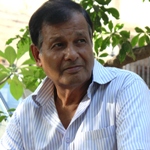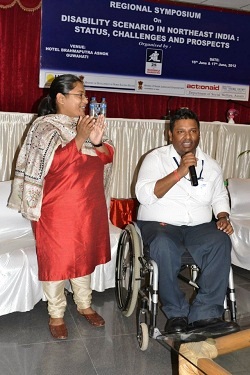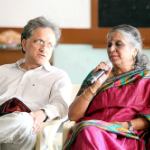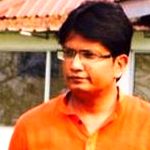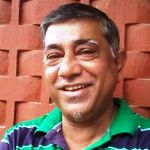Renowned English poet, playwright and critic T S Eliot, who had won the Nobel Prize for Literature in 1914, thought that "April is the cruelest month". But, for people of Assam and many others elsewhere in India, November, and to be precise November 2011, was the cruelest month. The month robbed them of Dr Bhupen Hazarika, perhaps one of the greatest Assamese ever born, and eminent writer and Jnanpith awardee novelist Dr Mamoni Raisom Goswami.
Shakespeare had said that this world is a stage where all men and women are merely players. They have their entrances and exits. But Bhupen Hazarika played his role so well that none of his countless admirers could ever dream of his exit. He dwells and will continue to dwell in their hearts perhaps as long as they are alive.
Now that he is no more, many fond memories come flooding back from that cloudland of the past.
It was a reception at the Tollygunge Club, Calcutta. The occasion was the wedding of the son of Ashish Kumar (Babloo) Choudhuri, former general manager of a major tea company. When the chairman of the group, Surendra Paul, fell to assassins' bullets on April 9, 1990 in Upper Assam, Babloo Choudhuri was sitting next to him and consequently, had received several bullets in his body. One of the bullets is still delicately lodged in his spine. He had a providential escape with his life.
The gathering was huge with guests from both India and abroad. Liveried waiters with trays of drinks and sikkins were crisscrossing through the crowd as politely as possible even as soft music wafted across the vast lawn of the club. I suddenly noticed an ebullient huddle in one corner, standing in the middle of which was Hemen Barooah, a tea magnate and a boyhood friend of Bhupen Hazarika. He is an excellent conversationalist and wit is indeed the very soul of whatever he speaks. A great connoisseur of music and art, Barooah had persuaded his friend to cut two LP discs on the matchless lyrics of Parvati Prasad Baruva which became a landmark of Assamese music.
When the crowd around him thinned, I approached and greeted him. By way of conversation, I enquired about Thengal, his house in Calcutta, named after his ancestral estate near Jorhat. He immediately invited me to visit Thengal the next evening and said, "Bhupen (Hazarika) will be there at about eight. You will like it." I promptly accepted the invitation.
The next evening when I, along with a friend of mine, alighted in front of his gate at Hastings Park Road, our eyes were dazzled by the decor of the place with a red carpet rolled out right up to the gate. As we stepped into the front porch of the impressive building wondering what the occasion might be, we were politely received by a liveried attendant who ushered us into a spacious living room adorned with priceless objects of art. Seated inside was a congregation of poets, painters and of course planters, including veteran R K Baruah, formerly of the Budlabeta Tea Company in those koi hai days and wife Thunu Baideu, daughter of famous tea planter, the late Heramba Prasad Barua of Jorhat. There was a whiff of delicate perfume lingering in the air and the congregation comprising both ladies and gentlemen was engrossed in a lively discussion. When I asked Hemenda, as we fondly call him, as to what the occasion was, he said with a disarming smile that it was just for us.
While I was talking to poet Gautam Prasad Barooah about his latest anthology of poems, at 8:30 pm sharp the door opened and everyone stood up to greet the legend - Bhupen Hazarika. He was fresh out of a shower, in immaculate kurta-pyjama, his trademark black cap firmly in place. His face was aglow with his winsome smile as he returned the greetings and settled down comfortably on a sofa.
Since the evening had started with poetry, I recited a poem in Bengali about Assam: "Ekhaney aamar swapner moto sattaar saathey jorano chharano ek desh/aami bhalobashi taar bonoraji neel paribesh..." and quizzed the audience as to who the poet was. Only one could answer - Amalendu Guha. The poet was my teacher, a renowned historian and poet. Bhupenda, as all of us call him, was inspired. He got up, went inside and brought back a book of poems that he had recently written. We eagerly asked him to recite his poems. He agreed but on condition that he would not sing that day.
Thereafter, he started reciting his poems in his rich baritone, which held the audience spellbound. I think it is the same anthology which is now in the process of being published posthumously. There were feeble requests for singing from some which he firmly turned down.
Thereafter, Hemen Barooah took the guests to his gallery to see the original paintings of Jamini Roy, Bikash Bhattacharjee, Ganesh Pyne, M F Hussain, Satish Gujral, Manjit Bawa et al and also scores of vintage photographs on every landing of the stairs. We indeed had a feast for our eyes. At the end of the excursion, I looked up at Bhupenda and asked him if he remembered that interesting story of a painting at Tezpur. Sometime ago, Dr Lakshmi Goswami of Tezpur had bought an abstract painting. But she could not hang it on the wall since she could not make out as to which side was up and which was down. Several people, including artists examined the painting, but nobody was able to find a solution. Then one day, Bhupenda came to her place. So, she asked him as well to solve her problem.
Bhupenda took just one look, and hung it on the wall the right way. Asked how he could make out which side was up, he said in a typical Sherlock Holmes style, "Elementary, dear Deep (pet name of Dr Goswami). There is an obscure signature on it and that side must be the bottom!"
After a sumptuous dinner with choicest drinks, most of the guests left. A few of us withdrew into an anteroom along with Bhupenda for coffee and cognac. I settled for a liquor. There was another request to Bhupenda to sing, but he turned it down again. Then being desperate, one of our planter friends, whose voice was absolutely discordant, to say the least, started singing or to be precise, started a caricature of one of the best compositions of Bhupen Hazarika. Bhupenda could not hold his temper any longer and asked our friend to shut up and started singing in his golden voice. We were all overjoyed. One song followed another and his mellifluous voice choked with emotion brought heaven down to earth. I involuntarily verbalized those famous words of the Persian poet Firdausi -
"Agar Firdaus bor ruey zamin ast
Hamin asto, hamin asto, hamin asto!"
If there is a paradise on earth,
It is this, it is this, it is this!
In the wee hours of the morning I returned to the hotel with a joy in my heart the like of which I never experienced before.

